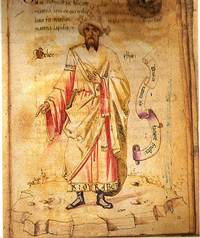
Abu Musa Jabir ibn Hayyan
15th-century European portrait of “Geber”, Codici Ashburnhamiani 1166, Biblioteca Medicea Laurenziana, Florence
| Born | c. 721 AD Tus, Persia, Umayyad Caliphate[1] |
| Died | c. 815 AD |
| Ethnicity | Arab[2][3] or Persian[4] |
| Era | Islamic Golden Age |
| Religion | Islam |
| Main interest(s) | Alchemy and Chemistry, Astronomy, Astrology, Medicine and Pharmacy, Philosophy, Physics, philanthropist |
| Notable work(s) | Kitab al-Kimya, Kitab al-Sab’een, Book of the Kingdom, Book of the Balances , Book of Eastern Mercury, etc. |
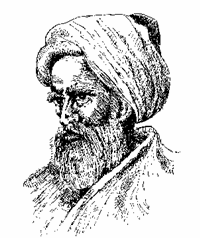
AHasan Ibn al-Haytham (Alhazen)
| Born | c. 965 CE[1](354 AH)[2] Basra, Buyid Emirate |
| Died | c. 1040 (aged 75)[3](430 AH)[4] Cairo, Fatimid Caliphate |
| Residence | Basra Cairo |
| Fields | Optics Astronomy Mathematics |
| Known for | Book of Optics, Doubts Concerning Ptolemy, Alhazen’s problem, Analysis,[5] Catoptrics,[6] Horopter, Moon illusion, experimental science, scientific methodology,[7] visual perception, empirical theory of perception, Animal psychology[8] |
| Influences | Aristotle, Euclid, Ptolemy, Galen, Banū Mūsā, Thābit ibn Qurra, Al-Kindi, Ibn Sahl, Abū Sahl al-Qūhī |
| Influenced | Omar Khayyam, Taqi ad-Din Muhammad ibn |
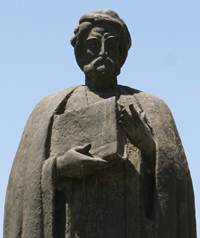
Ibn Khaldun
Statue at the Cathedral of St. Vincent de Paul, Avenue Habib Bourguiba, Tunis
| Born | 27 May 1332 Tunis, Hafsid Sultanate of Ifriqiya |
| Died | 19 March 1406 Cairo, Mamluk Sultanate of Egypt |
| Region | Maghreb |
| Religion | Islam |
| Denomination | Sunni[1] |
| Jurisprudence | Maliki[2] |
| Creed | Ash’ari[3] |
| Main interest(s) | Historiography Sociology Economics Demography Political science |
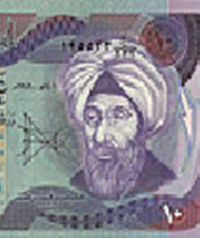
Ibn al-Haytham
Abū ʿAlī al-Ḥasan ibn al-Ḥasan ibn al-Haytham, also known by the Latinization Alhazen or Alhacen, was an Arab Muslim scientist, mathematician, astronomer, and philosopher. Wikipedia
| Born | July 1, 965 AD, Basra, Iraq |
| Died | March 6, 1040, Cairo, Egypt |
| Books: | Book of Optics, Ibn Al-Haytham’s Completion of the conics, more |
| Influenced by: | Al-Kindi, Aristotle, Ptolemy, Euclid, Thābit ibn Qurra, Ibn Sahl, Banū Mūsā, Galen, Abū Sahl al-Qūhī |
| Residence: | Basra, Iraq, Cairo, Egypt |
| Fields: | Optics, Astronomy, Mathematics |

Al-Mutanabbi
Abu at-Tayyib Ahmad ibn al-Husayn al-Mutanabbi al-Kindi was an Arab poet. He is considered as one of the greatest poets in the Arabic language. Much of his poetry revolves around praising the kings he visited during his lifetime. Wikipedia
| Born | 915 AD, Kufa, Iraq |
| Died | September 23, 965 AD, An Numaniyah, Iraq |
| Residence | Alhusein bin Alhasan bin Abdulsamad AlJa’fi |
| Books: | The Diwan of Abu Tayyib Ahmad Ibn Al Husain Al Mutanabbi, more |
| Influenced by: | Antarah ibn Shaddad, Saleh |
| Influences | Muhammad Mahdi al-Jawahiri, Abd al-Wahhab Al-Bayati, Mohammed Ridha Al-Shabibi |
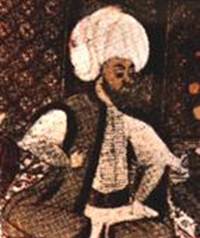
Al Kindi
He was the first of the Muslim peripatetic philosophers, and was considered as the “father of Islamic or Arabic philosophy”.[7][8][9] He was famous for promotion of Greek and Hellenistic philosophy in the Muslim world.[10] One of his main concerns was to show the compatibility of philosophy and speculative theology. However, he would prefer the revelation to reason, for he believed it guaranteed matters of faith that reason could not uncover.[10]
|
|




